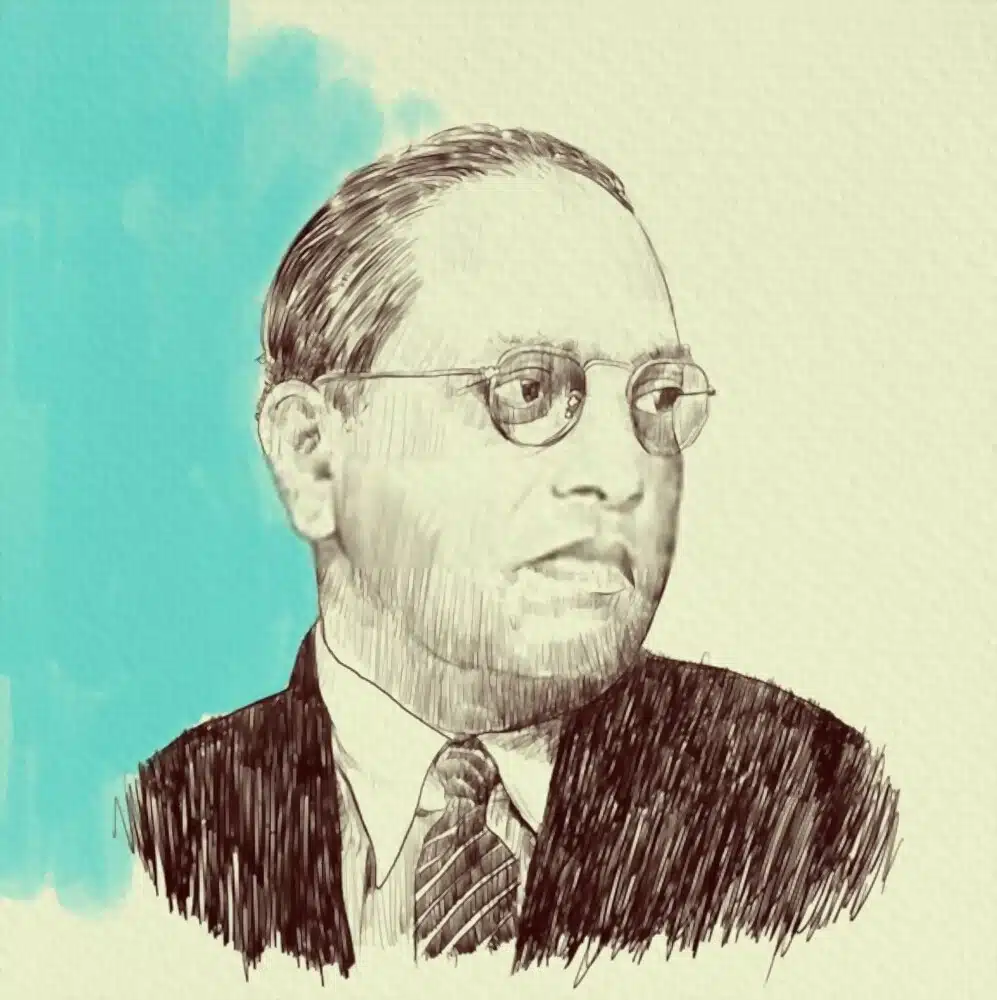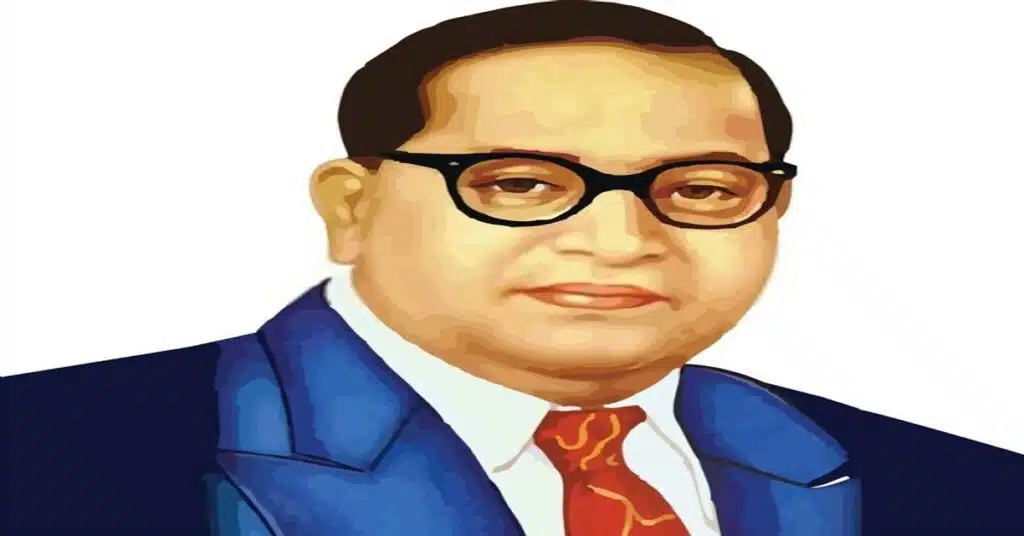
Dr. B.R. Ambedkar needs no introduction in India and across the world. He was a man of exceptional intellect, courage, and vision who dedicated his life to fighting for social justice and equality. This page provides the Sketch of Dr. B.R. Ambedkar. Go through these short and long Sketches for all classes.
As an architect of the Indian Constitution, Dr. Ambedkar played an important role in shaping modern India’s political landscape. He worked towards creating a fairer society for all Indians regardless of their caste or creed.
Given below are some of the facts related to the life of Dr. B. R. Ambedkar. Write a short bio – sketch of Dr. B. R. Ambedkar. You can take help of the clues given below:
- Popularly Known as Babasaheb
- Born on April 14, 1891
- Parents: Father: Subedar Major Ramji Sakpal
- Mother: Smt. Bhimabai
- Education: Both in India and abroad – Matric in 1907; B.A. in 1992; Joined Columbia. University in 1913; got Ph.D. in 1917.
- Deeply hurt to see the condition of the downtrodden.
- Appointed the Chairman of the Drafting Committee of Indian Constitution.
- Death: December 6, 1956.
- Bharat Ratna awarded to him in 1990.
Ans:- Dr. Bhimrao Ambedkar, popularly known as Babasaheb was born on April 14, 1891. He was the son of Subedar Major Ramji Sakpal and Smt. Bhimabai. He got the best education in India and abroad. After passing his matric and B.A. in 1907and 1912 respectively he joined Columbia University in 1913 and got the PhD degree in 1917. He was deeply hurt by seeing the treatment given to the downtrodden in India. He took an oath to do something for the downtrodden people. He was appointed the chairman of the Drafting Committee of the Indian Constitution which treats all people alike. He breathed his last on 6th December 1956. In recognition of his unique services, he was honoured with Bharat Ratna award (Posthumously) in 1990.
Download the above Biographical Sketch in PDF (Printable)
Also Read:
- Subhash Chandra Bose Biography
- Narendra Modi Essay
- Mother Teresa Bio Sketch
- Descriptive Paragraph on Einstein
- Essay on Atma Nirbhar Bharat
Sketch of Dr. B.R. Ambedkar- 100 Words
Dr. B.R. Ambedkar was a man of great intelligence. He was a great leader. He dedicated his life to fighting for the rights of marginalized communities in India. He had a strong determination and unwavering commitment to social justice. Dr. Ambedkar was not just a leader, but also an intellectual powerhouse. His expertise in law and economics served as essential tools in his fight against caste discrimination and oppression. Despite facing many challenges, he never gave up his mission to create an equitable society.
His dedication to social justice continues to inspire generations both within India and around the world. In times where inequality still exists in various forms globally, we must remember figures like Dr. Ambedkar. He has set exemplary examples by dedicating his life towards eradicating injustice from the society he they belonged to.
Short Note on Dr. B R Ambedkar in English- 150 Words

Dr. B.R. Ambedkar is fondly known as the father of the Indian Constitution. He was one of the most remarkable personalities in India’s history. His life depicts him with his iconic glasses and a stern look on his face, reflecting his determination to fight for social justice.
Born into a Dalit family, he faced discrimination and oppression from an early age but never gave up on his dreams of achieving equal rights for all Indians. His tireless efforts led to the abolition of untouchability. He ensured that every citizen had equal opportunities regardless of their caste or creed.
Apart from being a lawyer and politician, Dr. Ambedkar was also an advocate for education. He worked tirelessly towards ensuring quality education for all sections of society. He believed that only through education people can be free from ignorance and claim their rightful place in society.
His contributions to our democracy today – remind us that there is still much work left to be done before true equality can be achieved in our country.
Biographical Sketch of Ambedkar- 200 Words
Dr. B.R. Ambedkar, affectionately known as Baba Saheb, was a remarkable figure in the history of India. His life is not just a portrait but a symbol of hope, courage, and determination for millions of Dalits in India. There are people who have been oppressed and discriminated against for centuries. Dr. Ambedkar had an unwavering commitment to social justice. His intellect and his tireless efforts to empower the marginalized communities are still effective.
He travelled an incredible journey from being born as an untouchable in a small village in Maharashtra to becoming one of the most influential leaders of independent India and drafting its Constitution. His life story is one of struggle and perseverance against all odds.
He dedicated his life to challenging these injustices through his writings, speeches, and political activism.
His life is an example that even amidst adversity, it is possible to rise above one’s circumstances through sheer grit and determination. It inspires us all to strive towards creating a world where every individual is treated with dignity and respect regardless of their caste or creed.
In conclusion, his life and deeds evoke emotions that cannot be expressed in words. His life speaks volumes about his legacy which continues to inspire generations even today.

Bio Sketch of Dr. B.R. Ambedkar- 500 + Words
Dr. Bhimrao Ramji Ambedkar, also known as Babasaheb Ambedkar, was a social reformer and politician who dedicated his life to fighting for the rights of India’s marginalized communities.
Born in 1891 in Mhow, Madhya Pradesh, Dr. Ambedkar belonged to the Dalit community that faced extreme discrimination based on caste.
Despite facing numerous challenges due to his caste and economic status, Dr. Ambedkar excelled academically and pursued higher education at prestigious institutions like Columbia University and the London School of Economics. His academic achievements led him to become one of India’s foremost intellectuals.
Throughout his life, Dr. Ambedkar fought against social injustice through various means- writing books and articles highlighting issues related to untouchability and caste-based discrimination; leading nationwide movements such as Dalit Mahasabha; drafting laws guaranteeing equality for all Indians regardless of their background – including The Constitution (Scheduled Caste) Order Act 1950 which provided reservations for scheduled castes in government jobs.
Dr. BR Ambedkar’s legacy is immense – he not only advocated for equal rights but also inspired generations with his commitment towards achieving it!
Early life of Dr. Ambedkar
Dr. B.R Ambedkar was born on 14th April 1891 in Mhow, Madhya Pradesh. He belonged to the Mahar caste and faced severe discrimination from society. His family faced financial difficulties which worsened after his father passed away when he was only fifteen years old.
Despite facing immense obstacles, Dr. Ambedkar continued his education and completed his matriculation from Elphinstone High School in Bombay (now Mumbai). He then went on to pursue higher education at the University of Bombay where he earned a degree in Economics and Political Science.
During this time, Dr. Ambedkar experienced first-hand the discrimination against lower castes as he was not allowed to sit inside the classroom but had to sit outside with the other ‘untouchables. However, these experiences also fueled him with a desire to fight for equal rights for all.
With his strong determination and academic excellence, Dr. Ambedkar received scholarships that enabled him to travel abroad for further studies at Columbia University in New York City where he obtained a doctorate degree in economics.
Despite facing numerous challenges early on in life due to caste-based discrimination and poverty, Dr. B.R Ambedkar persevered through hard work and dedication towards achieving success both academically and professionally.
Education of Dr. Ambedkar
Dr. B.R. Ambedkar was a brilliant student who excelled academically despite facing discrimination and social barriers that came with being born as an untouchable in India. Despite this, he managed to complete his education at some of the most prestigious institutions in the country.
Ambedkar completed his primary education at a local school before moving on to study at Elphinstone College in Bombay (now Mumbai). However, he faced caste-based discrimination here too and found it difficult to secure housing due to his low-caste background.
After completing his undergraduate studies, Ambedkar went on to pursue postgraduate studies at Columbia University and LSE (London School of Economics) where he obtained several degrees including MA in Economics and PhDs in both economics and law.
He became the first Dalit scholar ever to earn a doctorate degree overseas which proved instrumental later when fighting for equality as people respected him more because of his academic achievements. His focus on gaining knowledge helped him understand how important education is for uplifting marginalized communities.
Despite all odds against him, Dr. Ambedkar’s thirst for knowledge propelled him forward towards success – proving that through perseverance and hard work one can overcome any obstacle thrown their way!
What did Dr. B.R. Ambedkar do for India?
Dr. B.R. Ambedkar is one of the most noteworthy figures in Indian history, known for his contributions towards shaping a modern India that was more inclusive and equitable. He fought tirelessly against social discrimination and economic inequality throughout his life.
One of Dr. Ambedkar’s most significant contributions to India was serving as the chief architect of the Indian Constitution, which he drafted with principles of democracy, equality, and justice at its core.
Moreover, he played an instrumental role in ensuring equal rights for marginalized communities such as Dalits or untouchables by fighting for their rights to education and employment opportunities.
Dr. Ambedkar also founded various organizations aimed at uplifting oppressed castes in society while advocating for policies that would eradicate poverty from India altogether. Through his activism and extensive research on ancient Hindu texts, Dr. Ambedkar exposed the inherent caste-based discrimination within religion while providing a new perspective on spiritualism that emphasized compassion over dogma.
Dr. B. R. Ambedkar dedicated his entire life to empowering those who were historically disempowered due to societal prejudices entrenched deeply into Indian culture thus creating a better future for them through constitutional means.
What is the legacy of Dr. B.R. Ambedkar?
Dr. B.R Ambedkar’s legacy is a multifaceted one that has left an indelible impact on Indian society. He was one of the most prominent leaders in India’s struggle for independence and was instrumental in creating the Constitution of India, which remains one of his greatest contributions to the nation.
Ambedkar’s vision for a just and equitable society is at the heart of his legacy. He fought tirelessly against caste-based discrimination, advocating for social justice and equal rights for all citizens regardless of their background or social status.
His commitment to education led him to establish several institutions that continue to provide opportunities for underprivileged communities today. His emphasis on education as a tool for empowerment continues to inspire generations in India.
Moreover, Dr. Ambedkar’s contribution towards women’s rights cannot be ignored either. He worked hard towards making divorce legal among Hindus and advocated property rights & inheritance laws favoring women long before any other lawmakers even considered such changes.
Dr. B.R Ambedkar remains an inspiration not only in India but around the world where people struggle with inequality and injustice. His unwavering commitment towards building a just society continues to serve as an example, inspiring millions across geographies even today!
Work and Career of Dr. Ambedkar
Dr. B.R. Ambedkar’s work and career were dedicated to the upliftment of India’s marginalized communities, particularly the Dalits or untouchables. As a lawyer, he fought for their rights and worked tirelessly to eradicate caste-based discrimination from Indian society.
In 1927, Dr. Ambedkar founded the Bahishkrit Hitakarini Sabha, an organization that aimed at promoting education and socio-economic empowerment among Dalits. He also started several newspapers like Mooknayak and Bahishkrit Bharat to spread awareness about social injustice.
As a member of the Constituent Assembly of India, Dr. Ambedkar was instrumental in drafting India’s Constitution which enshrined equality before law for every citizen regardless of their caste or religion.
Dr. Ambedkar served as independent India’s first Law Minister under Jawaharlal Nehru’s Cabinet where he introduced several progressive laws including Hindu Code Bill which gave equal property rights to women and abolished polygamy.
Dr. B.R. Ambedkar left a significant impact on Indian politics by working towards creating an inclusive society through his legal reforms and advocacy efforts for marginalised communities in India
Political views of Dr. Ambedkar
Dr. B.R. Ambedkar was a prominent political leader who fought relentlessly for the rights of marginalized communities in India. He firmly believed that democracy could not be achieved without social and economic justice.
Ambedkar’s political views were shaped by his own experiences as a member of the Dalit community, which faced discrimination and oppression at every level. He saw caste-based discrimination as an obstacle to equality and social justice.
In 1936, Ambedkar founded the Independent Labour Party, which aimed to represent the interests of workers from all sections of society. He also advocated for land reforms and labor rights.
Ambedkar played a crucial role in drafting India’s constitution after independence from British rule. His vision for a secular democratic republic ensured that every citizen had equal rights regardless of their religion or caste.
Despite facing opposition from conservative groups, Ambedkar remained committed to his ideals until his death in 1956. His contributions towards creating an inclusive society are still celebrated today.
In summary, Dr. B.R Ambedkar was a visionary leader whose political views were centered around achieving social justice through democracy and inclusion.
Later life of Dr. Ambedkar
After India gained independence in 1947, Dr. Ambedkar was appointed as the country’s first Law Minister. He played a crucial role in drafting the Indian Constitution and worked tirelessly to ensure that it upheld the principles of equality and justice for all citizens.
In his later years, Dr. Ambedkar focused on social activism and continued to fight against discrimination based on caste, gender, and religion. He founded the Bharatiya Bauddha Mahasabha (Buddhist Society of India) in 1955 and converted to Buddhism along with thousands of his followers.
Dr. Ambedkar’s conversion to Buddhism was a significant turning point in his life as he believed that it would help eradicate caste-based discrimination from society. He also wrote extensively on Buddhist philosophy and its relevance to modern-day issues.
Despite facing severe health problems towards the end of his life, Dr. Ambedkar continued to work towards achieving social justice until his death on December 6th, 1956.
The impact of Dr. Ambedkar’s legacy can still be felt today through various policies aimed at empowering marginalized communities such as Dalits and other oppressed groups in India. His vision for an equal society continues to inspire millions around the world who are fighting against discrimination based on race, caste or creed.
Death of Dr. Ambedkar
On December 6, 1956, at the age of 65, Dr. Ambedkar passed away due to complications from diabetes and other illnesses. His death marked the end of an era for India’s social and political landscape.
Following his passing, thousands of mourners gathered in Mumbai to pay their respects to Dr. Ambedkar. His body was cremated with full state honors on a hilltop in Dadar where now stands the Chaityabhoomi monument dedicated to him.
Dr. Ambedkar’s contribution towards uplifting Dalits and improving their socio-economic status is immense and cannot be overlooked even today. His teachings continue to inspire generations of Indians across castes and religions.
The Constitution that he helped draft has stood the test of time as a beacon of democracy in India. The constitutional provisions ensure equality before law irrespective of caste or religion which has empowered millions since its inception.
While his physical presence may have left us more than six decades ago but his ideals still resonate strongly among people today making him one of the most revered figures in Indian history who will always be remembered as one who fought tirelessly against discrimination until his last breath
Conclusion
Dr. B.R. Ambedkar was a visionary and an advocate for social justice who dedicated his life to fighting against caste discrimination and ensuring equality for all Indians. He played a crucial role in the framing of the Constitution of India, which is considered one of the most comprehensive constitutions in the world.
Ambedkar’s legacy continues to inspire millions today, as he remains an icon for those fighting against inequality and injustice across India and beyond its borders. His teachings continue to be relevant in modern times, particularly in light of recent events that have highlighted ongoing struggles for social justice.
However, it is important to note that while Ambedkar made significant contributions towards creating a more just society, there is still much work left to be done. Discrimination based on caste persists in many parts of India, highlighting the need for continued efforts towards building a more equitable society.
Dr. B.R. Ambedkar’s life serves as an example not only of what can be accomplished by hard work and perseverance but also as a reminder that we must never stop striving for progress towards greater equality and justice – both within our own communities as well as globally.